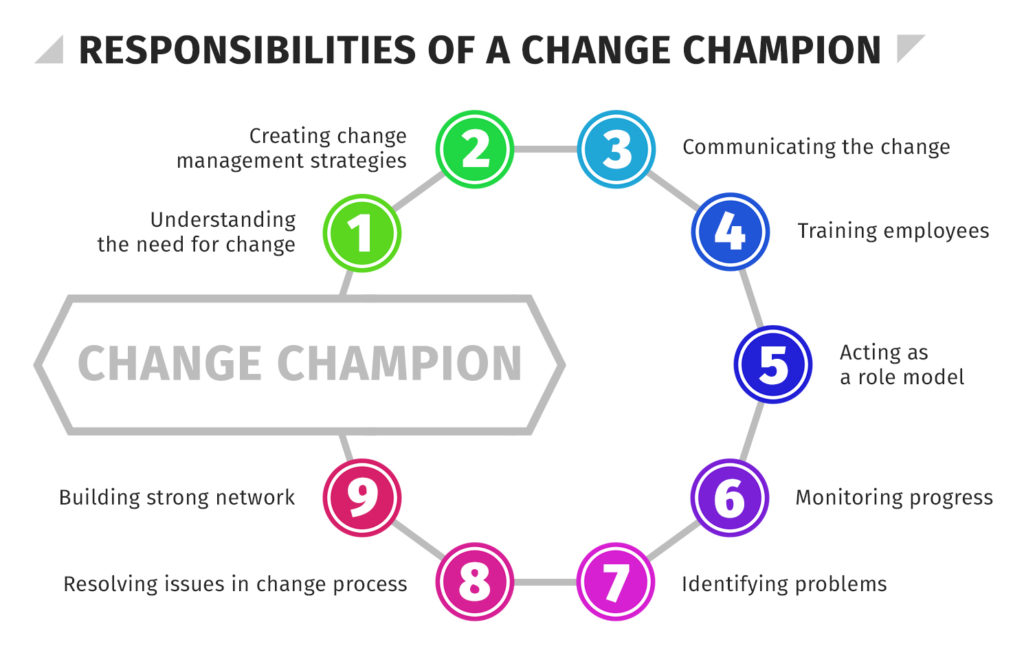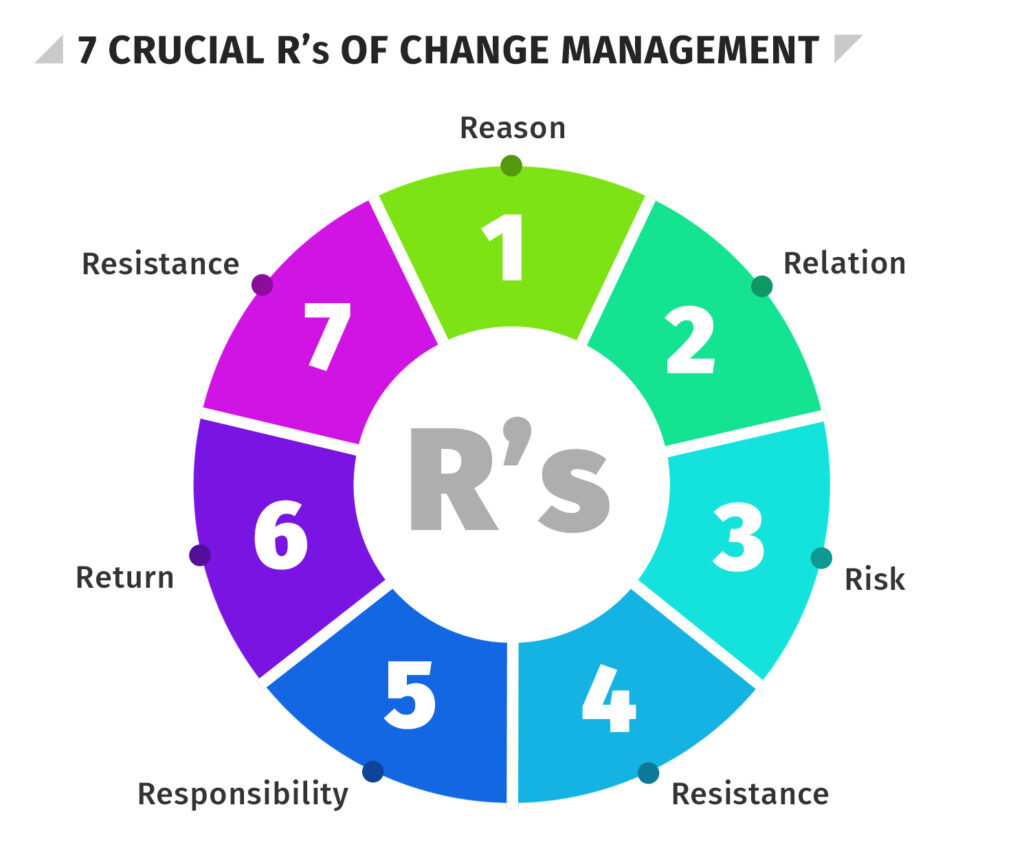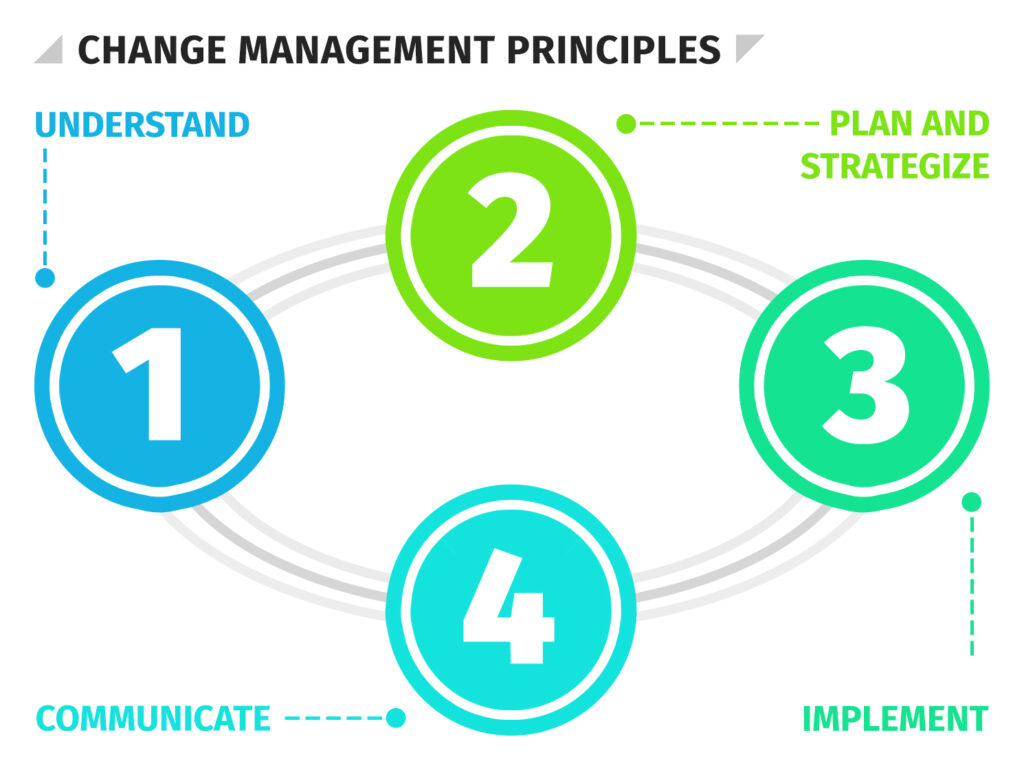Change champions assist organizations undergoing a change process. They help ensure that the change implementation is successful and that employees are on board.
Implementing and sustaining organizational transformation is challenging. Whether it’s a new software system, a change in company culture, or something else, there is always resistance to change. Change managers alone cannot cope with all the challenges of organizational change. This is where change champions come in.
This article discusses the role of change champions and how they help your organization. So, let’s jump into this article.
What does a Change Champion Do?
Learning about the role of a change champion is vital for understanding how they help during organizational changes. It is also vital for employers to choose the right candidate for a champion post. Here are the change champion’s responsibilities:
1. Understanding the Change
Change management is a complex process. Change champions must first understand it themselves to implement a change. They must grasp the goals of the change and what is required of employees. Understanding the change and the need for changes is crucial as they can’t convince others if they are not aware of the change procedure.
2. Creating Change Management Strategies
Creating change management strategies is challenging for any organization, as they help align change efforts with organizational goals. To carry out this task, the change management team works with employees and understands their needs. A change champion plays a significant role in creating these strategies.

Change champions work with senior managers to develop these strategies. They use their knowledge and experience to create successful strategies. Moreover, they work with employees to ensure the strategies are achievable and meet their needs.
3. Communicating the Change
Communicating a change to employees is challenging as most resist change. Change managers inform employees about the change with enough information for them to understand it. They find this balance to keep employees in the loop without feeling overwhelmed.
Change champions communicate all the details to get employees on board with the change. Without effective communication, the change will fail. Change champions explain the change and its benefits in an easy-to-understand way. They also help employees see how the change will impact their work. This involves creating materials that explain the steps of implementing change and its objectives.
They also hold employee meetings to discuss the change and answer any questions. This way, change champions gain employees’ trust and gain their buy-in for the change.
Are you looking to master change management skills? Enroll in our top-rated change management course to learn the fundamentals:

4. Training Employees
Training is an essential step in the change implementation process. It ensures that employees continue performing their duties without any hindrance during and after the change. Change champions train employees on the new procedures and systems. They also provide support during the training so employees get clarification when needed.
Change champions act as mentors for employees during the training process. They guide them and provide support. After the training, change champions check in with employees to ensure they are comfortable with the change and understand how to implement it. They are familiar with the various tools and resources available and support employees during the change process.
5. Act as a Role Model
When an organization undergoes a change process, its employees need someone they can admire. Change champions act as role models for employees during this process. They show employees how to adapt to change and become more productive.

Change champions lead by example and help employees see that change is possible. Leading by example motivates employees and encourages them to embrace change.
6. Monitoring Progress
Change champions monitor progress to ensure that the change process is on the right track. They supervise the change implementation process and identify areas for improvement. Moreover, they provide feedback to employees on their progress.
This feedback motivates employees and keeps them on track. Change champions also use this information to improve the change process and ensure the success of the business transformation by monitoring progress.
7. Identifying Problems
Problems arise during the change implementation process. No matter how well-planned the change is, unforeseen obstacles will always strike. Change champions play an important role in identifying those problems. This helps prevent problems from occurring and causing further disruption. They also work with employees to find solutions to these problems.
8. Resolving Issues in Change Process
When problems occur during a change process, the need for someone to work and resolve them becomes vital. Change champions work with senior change managers to find solutions to problems.
Change champions also liaise with other departments to ensure that the change process remains on track and resolve any issues so that it can continue.
9. Building a Strong Network
A strong network is vital for the success of any change process. A change champion networks with employees, senior leaders, and other stakeholders. Change champions use their network to ensure the change process’s success. They work with all stakeholders to onboard everyone with the change.
A strong network also ensures that change champions have the resources to carry out their duties. Change champions access that information and resources to make decisions.
Requirements for Change Champions
If you want to pursue a career as a change champion, you must know the requirements for the job. Here are some of the standard requirements for change champions:
1. Supportive to New Ideas
Change champions must support new ideas. As a change champion, you must exhibit skills to welcome change and the willingness to embrace it. Change champions must hold the potential to embrace new ideas and support them. If you are not flexible, you cannot handle change. You must see the change from the employees’ perspective and understand their needs.
2. Excellent Interpersonal Skills
Interpersonal skills are key to excelling in change champion roles. Change champions communicate with employees to build strong relationships with them. They explain the change process and its benefits to employees. You, as a change manager, must listen to their concerns and address them. Change champions are responsible for resolving conflicts and building consensus.

To become a successful change champion, one must understand the change process. Identify the different stages of change and communicate them to employees.
3. Leadership Skills
Change champions act as masters who convince other employees to support the change. To do this, you need strong leadership skills. To improve leadership skills, work to inspire others and motivate them. You must delegate tasks and give clear instructions.
The change champion role is a decisive position, and the champion must take ownership of the change process. Change champions are responsible for making tough decisions and standing by them. They must also exhibit skills for working under pressure and meeting deadlines.
4. Effective Project Management Skills
Project management helps you understand a project’s various steps and objectives. It also enables you to create a roadmap for the project, which you can use to track its progress.
Project management skills are vital for change agents as they help them identify the various tasks involved in a change project. This allows them to create a timeline for the project and track its progress. Change champions must exhibit the ability to plan and execute change projects.
5. Problem-Solving Capability
When dealing with a change process, conflicts and problems arise. They can disrupt the progress of a project and cause delays. As a change champion, you identify these problems and find solutions for them. Change champions troubleshoot issues that may arise during the change process. They also come up with creative solutions to problems.
A change agent who has the competency to solve problems in a shorter duration is precious to an organization. They save time and resources for the company and make the workplace more productive.
6. Qualifications of a Change Champion
There are no specific qualifications to become a change champion. However, it is helpful if you have a degree in business administration or human resource management. Certificates from reputable institutes make you an attractive candidate. Certifications add to the credibility of a change champion and show that you have the required skills for the job.
Conclusion
Changer champions need extensive management and people-handling skills to fulfill their change management duties. If you want to become one, master the fundamental change management skills. Upskill your knowledge and keep up-to-date with the latest change management market techniques and trends.
FAQs
Here is a list of the most asked questions about the change champion role:
What is a change champion?
A change champion is an organization member who actively supports and drives change initiatives. They promote new processes, behaviors, or strategies, ensuring employees understand the benefits of change. Change champions act as influential advocates, bridging the gap between leadership and the wider workforce to encourage adoption and commitment.
How do change management champions help in overcoming resistance?
Change management champions are instrumental in helping organizations overcome resistance to change. These champions build trust and credibility by communicating, addressing employee concerns, and sharing the benefits of change. Their close relationship with their peers allows them to identify potential challenges early and address them effectively, thus minimizing the resistance that often accompanies significant changes.
What is the role of change leaders in an organization?
Change leaders are individuals responsible for steering an organization through a transition. Unlike change champions, who promote change at a grassroots level, change leaders typically hold higher-level positions and are in charge of setting the vision, creating the strategy, and guiding the overall change initiatives. They ensure that the organization’s goals and the actions needed to achieve successful change are aligned.
A change champion network is a group of dedicated individuals who collaborate to support transformation efforts across various parts of an organization. This network ensures that the change message is consistent and far-reaching. It helps sustain momentum by providing peer-to-peer support, addressing concerns in real-time, and building a community that is committed to change. Such a network is crucial for ensuring that change initiatives are planned and effectively implemented throughout the organization.
Why is overcoming resistance crucial for successful change initiatives?
Overcoming resistance is essential for the success of any change initiative because resistance can significantly slow down or derail progress. Engaging with change champions and a champion network allows organizations to understand the reasons behind resistance and take actionable steps to mitigate it. By involving employees at multiple levels and listening to their feedback, organizations can foster an environment of support, ultimately leading to a smoother and more successful change journey.
If you are new to human resources and are looking to break into a change champion role, we recommend taking our Change Management Course, where you will learn how to build your skillset for managing organizational change.













